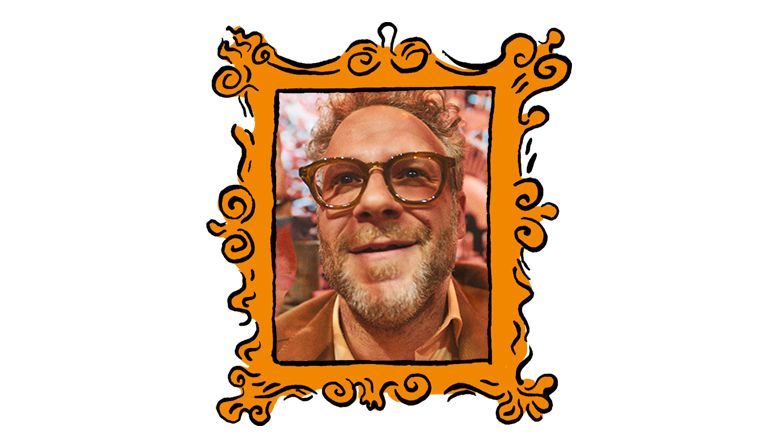In case you hadn’t noticed, the motion picture industry has a really high opinion of itself. Since 2010, no fewer than three Best Picture winners have reflected on the vagaries of the film business, in various forms (Argo, The Artist and Birdman, in case you were wondering). Many more major pictures, from Tarantino’s Once Upon A Time in Hollywood to American Fiction, are all movie-centric. The basic message that runs through all of them can be summarised thusly: studios are profit-driven, actors are egotistical, directors are obsessive, writers are marginalised and producers are tyrannical, but at the end of the day great art is produced, against the odds, and its creators deserve to be lauded for their brilliance.
This is the central message of the new Seth Rogen show, The Studio, which launches this week on Apple TV. Rogen plays Matt Remick, the newly appointed head of the fictitious Continental Studios, who has the noble but immediately doomed idea that he will save a declining industry by the simple expedient of hiring great filmmakers to make great films. This swiftly goes awry. As Bryan Cranston’s studio chairman sneeringly informs him, “You’re obsessed with actors and directors liking you, rather than being obsessed with making the studio as much money as possible.” The duality between art and commerce has existed since the beginning of the medium, and it is one of Hollywood’s more widely known tropes that the latter will always win out. How else could you explain the existence of Sonic the Hedgehog 3 were it not for its half-billion dollar worldwide gross?
The Studio has so far received excellent reviews, all of which have saluted Rogen’s multi-hyphenate skills as actor, writer and director, but the consensus is also that this is an affectionate rather than scathing look at the industry. After all, Rogen’s contacts list has yielded cameos including Martin Scorsese, Charlize Theron and Netflix’s Ted Sarandos, all of whom merely nibble at the hand that has fed their careers and lifestyles for many decades. In this regard, there is considerable precedent. It is a sly in-joke that the Cranston character is named Griffin Mill, which is also the name of Tim Robbins’s protagonist in Robert Altman’s The Player, another much-praised satire of moviemaking that attracted enormous attention for its star-studded cast playing themselves when it was released in 1992.
Three decades later, The Player’s targets feel all too obvious. Big-name stars are difficult to work with? Studios want pat happy endings over edgier, more cynical resolutions? Knock me down with a feather. Yet Altman needed to corral his own retinue of stars, and nobody wanted to hurt their careers. There are no jokes here more challenging than those you would find in the host’s opening monologue at the Academy Awards every year.
No film—nor Oscar emcee—has dared to veer into the territory that Ricky Gervais bestrode when he used to present the Golden Globes. He told the recipients of awards in 2020 that “If you do win an award tonight, don’t use it as a platform to make a political speech. You’re in no position to lecture the public about anything. You know nothing about the real world. Most of you spent less time in school than Greta Thunberg. So if you win, come up, accept your little award, thank your agent and your God, and f**k off, okay?” The looks of shock and consternation on the faces of the stars were real. Gervais had dared to suggest that their deeply held liberal beliefs were as ephemeral and pointless as the outfits that they’d worn on the red carpet. Half a decade later, Kamala Harris’s defeat in the presidential election, despite the endorsements of most of Hollywood, proved only that the average American was far less impressed by the blandishments of the film industry than they had imagined. Perhaps voters could still remember the dreadful lockdown cover of “Imagine”.
For really biting satire of Hollywood, you have to go back to Nathanael West’s Day of the Locust, published in 1939. It ends with a repressed studio accountant—named, of all things, Homer Simpson—stomping an obnoxious child star to death at a Los Angeles film premiere, sparking a riot in the process. Yet even before then, West has painted a terrifying picture of a venal, vicious industry in which even commerce is subjugated to exploitation and sexual power. It was filmed, very well, in 1975, and was, of course, a box office flop, just as Damien Chazelle’s similarly coruscating 2022 film Babylon, an unflattering account of the early years of the industry, failed to connect with audiences. Yet Day of the Locust is now considered a classic, and Babylon is being reappraised too.
Diverting though The Studio undoubtedly is, Rogen wants to be employed by Hollywood once again when it concludes. And so you can’t escape the sense that punches are being pulled, just as they were in Armando Iannucci and Sam Mendes’s anaemic Marvel-targeting The Franchise last year. So laugh along at Rogen’s creation, but don’t expect real venom. That will be reserved for a braver—and probably less seen—show altogether.
Why can’t Hollywood satirise itself?
It certainly tries. But, as efforts such as ‘The Studio’ demonstrate, the punches never truly land
March 27, 2025

Seth Rogen in ‘The Studio’ © Apple








